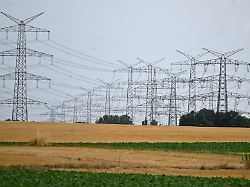“Brussels Declaration”
Countries are increasing pressure on traffic lights for cheap industrial electricity
September 7, 2023, 4:29 p.m
The federal states are demanding cheaper electricity for their companies. With rare unanimity, they are jointly advocating for an industrial electricity price. Chancellor Scholz has so far avoided a clear positioning. At the Union there is resistance in the parliamentary group.
In view of increased energy costs, the federal states have unanimously spoken out in favor of a temporary bridge electricity price to relieve the burden on energy-intensive companies. With a “Brussels Declaration” they are increasing the pressure on Chancellor Olaf Scholz on the issue of subsidized industrial electricity prices. The head of government has so far avoided a clear position and initially called for a debate about financing. Meanwhile, approval comes from Economics Minister Robert Habeck. He is happy about the support, especially from the Union Prime Minister. According to a spokesman, the EU Commission does not want to comment on the plans because they are currently still being discussed at national level. Commission chief Ursula von der Leyen is fundamentally prepared to examine the project.
The “Brussels Declaration” states that increased energy costs are an “acute obstacle to the recovery of the economy and the return of industrial production to pre-crisis levels”. Therefore, it must be possible for the EU member states for a transitional period “to establish a competitive bridge electricity price, especially for energy-intensive companies that compete internationally, until affordable renewable energies are available on a sufficient scale.”
Lower Saxony’s Prime Minister Stephan Weil referred to the steel and chemicals, copper and aluminum as well as glass, ceramics, cement and many other industries. They are at risk of “very, very great harm.” NRW Prime Minister Hendrik Wüst said that a bridge electricity price should not be nice. “But so far I haven’t heard any other answer from those who don’t want that.”
Pressure also from the SPD – resistance from the Union
For the Association of German Mechanical and Plant Engineering (VDMA), however, the call for greater government funding sends the wrong message. A bridge electricity price would counteract a European approach to jointly tackling global problems such as energy costs and threaten to distort the European internal market.
Meanwhile, despite Scholz’s reservations, calls for an industrial electricity price are also growing louder from within the SPD ranks. It is “of central importance to ensure the continued existence of good jobs in Europe,” said the chairman of the SPD group in the European Parliament, Jens Geier. “The energy-intensive industry is a key driver of low-carbon production and a guarantee of prosperity in the European Union.”
The SPD parliamentary group recently decided – in the absence of Chancellor Scholz – its concept for a state-subsidized industrial electricity price. It should initially be limited to five years, amount to five cents per kilowatt hour and apply to companies particularly affected by high energy costs. The state should cover the difference to the average electricity price on the exchange, which is currently around 8.95 cents.
Resistance comes from the Union faction: “Such a subsidy only helps a few, requires a long approval process with the EU Commission and also creates new bureaucracy,” said CSU finance expert Sebastian Brehm. “But we need a quick remedy, which we can achieve on our own by simply reducing electricity taxes,” he added.
At the end of August, CDU party and Union faction leader Friedrich Merz appeared open to talks about an industrial electricity price. What is important first, however, is a reduction in network fees and electricity taxes. “And then, if necessary, we will also talk about a bridge electricity price.”
